
Public Hearing Held On Bill To Disband Washington Fish And Wildlife Commission
House Bill 2434 and its bid to disband the Washington Fish and Wildlife Commission won’t go anywhere in Olympia this session, but this morning its prime sponsor certainly achieved his goal in introducing the “hand grenade.”
A couple others went off as well.
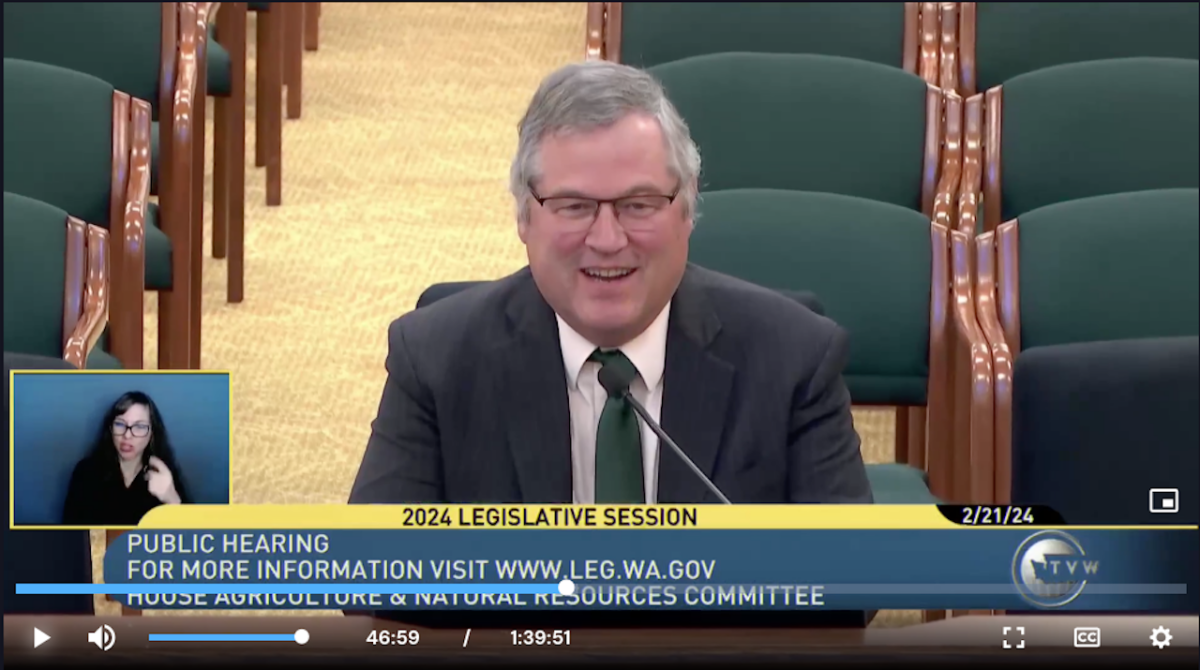
Rep. JT Wilcox (R-Yelm) told members of the House Agriculture and Natural Resources Committee he wanted to start a discussion about a “problem” – the troubling direction of the commission in recent years and how, in his bill’s words, members “have made decisions contrary to the promises they and those that have come before them have made … ignored the science and their own staff, letting special interests dictate the Department of Fish and Wildlife’s direction.”
He said that the intent of the commission was to “provide the best conservation using the best available science, and to provide the greatest hunting and fishing opportunities for both tribal and non-tribal hunters and fishers.”
Hitting on the tribal element, Wilcox said that commissioner statements of late show that, among other things, they aren’t quite grasping the Boldt Decision and, essentially, the comanagement of fisheries and other natural resources that flows out of it.
Along with sending the nine-member commission packing, Wilcox’s bill would also task the governor – in coordination with state lawmakers – with hiring WDFW’s director.
“It’s important that there be responsibility and accountability. And when you have an appointed commission, you lose quite a bit of that. And so that’s the solution that we should be looking for in the future,” Wilcox said.
He acknowledged that HB 2434 might not offer the best fix, but with an eye on another four-digit number, 2025, he was also interested to hear the public’s testimony on it.
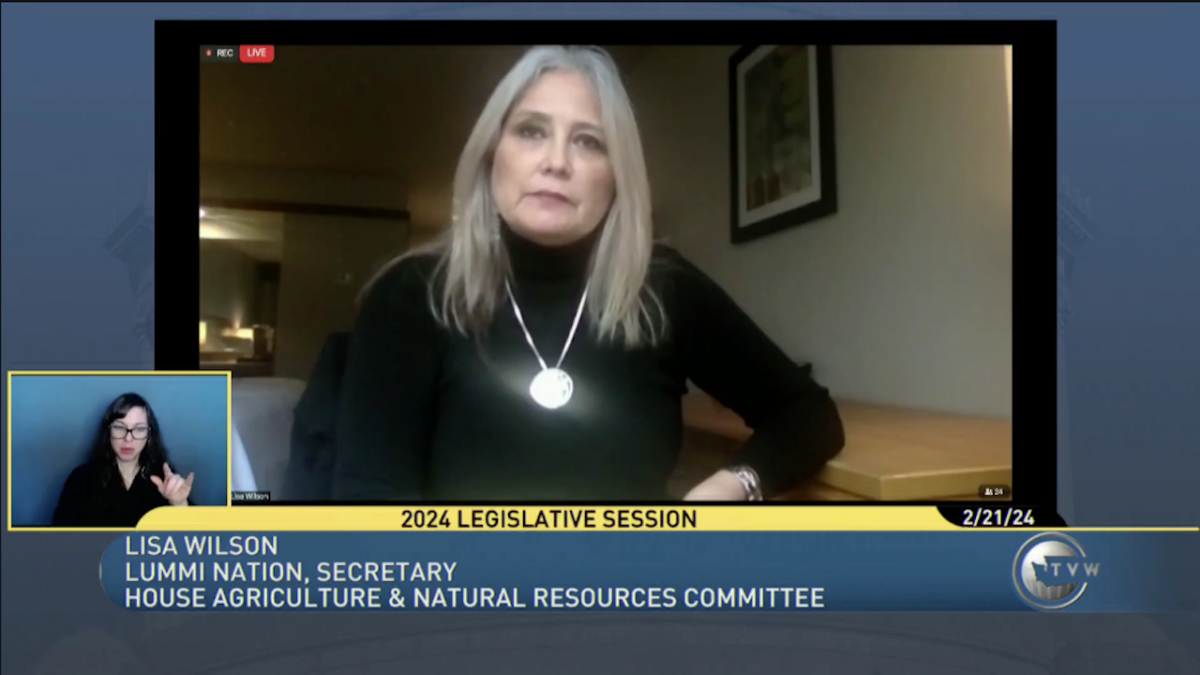
FIRST UP TODAY WAS LISA WILSON, secretary of the Lummi Business Council and vice chair of the Northwest Indian Fisheries Commission.
Wilson said she “definitely” has concerns about the state Fish and Wildlife Commission and raised the panel’s recent rush to pass the unilateral Conservation Policy without holding government-to-government consultations with the tribes on it.
“We brought our concerns to the governor before a few of these members were appointed … and they’ve proven that we were right that they do not respect treaty rights. They have acted paternalistically and outright pretty much racist,” Wilson said of some commissioners.
That proposed policy was abruptly pulled just before a scheduled late January vote after seven tribes demanded consultation on the far-reaching guidance that would have in part defined the word “conservation,” which has already been established through Boldt, the tribes said.
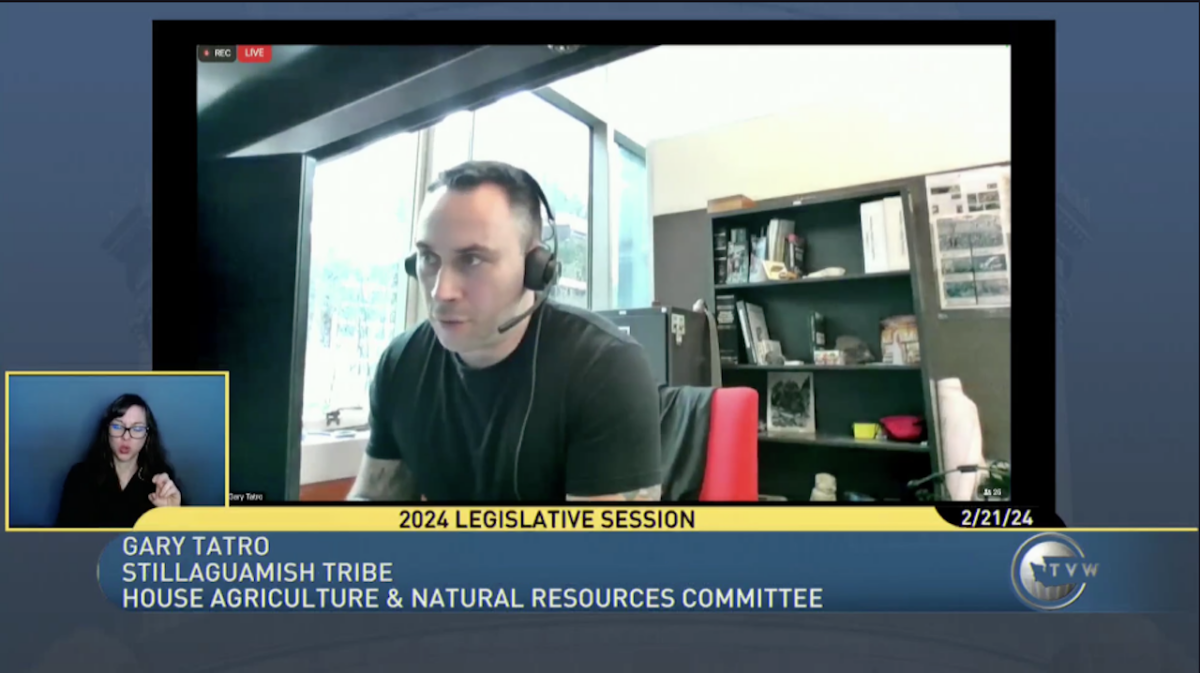
Gary Tatro of the Stillaguamish Tribe pointed to another example of the commission developing a unilateral policy: ending the state spring black bear hunt, which he said “was not only sustainable, but an important management tool for wildlife managers and supported by the WDFW.”
“Ultimately, I’m confident that this House bill would serve to improve and streamline resource management at the state level while eliminating future policy quagmires within WDFW, and I urge you to consider your support,” Tatro said.
Wilson and Tatro were signed in today as “other” and “pro” on the bill, respectively.
Also weighing in from the north end but firmly in the pro camp, Tom Nelson of The Outdoor Line, who said the commission had devolved into a “bastion of ideology over biology.”
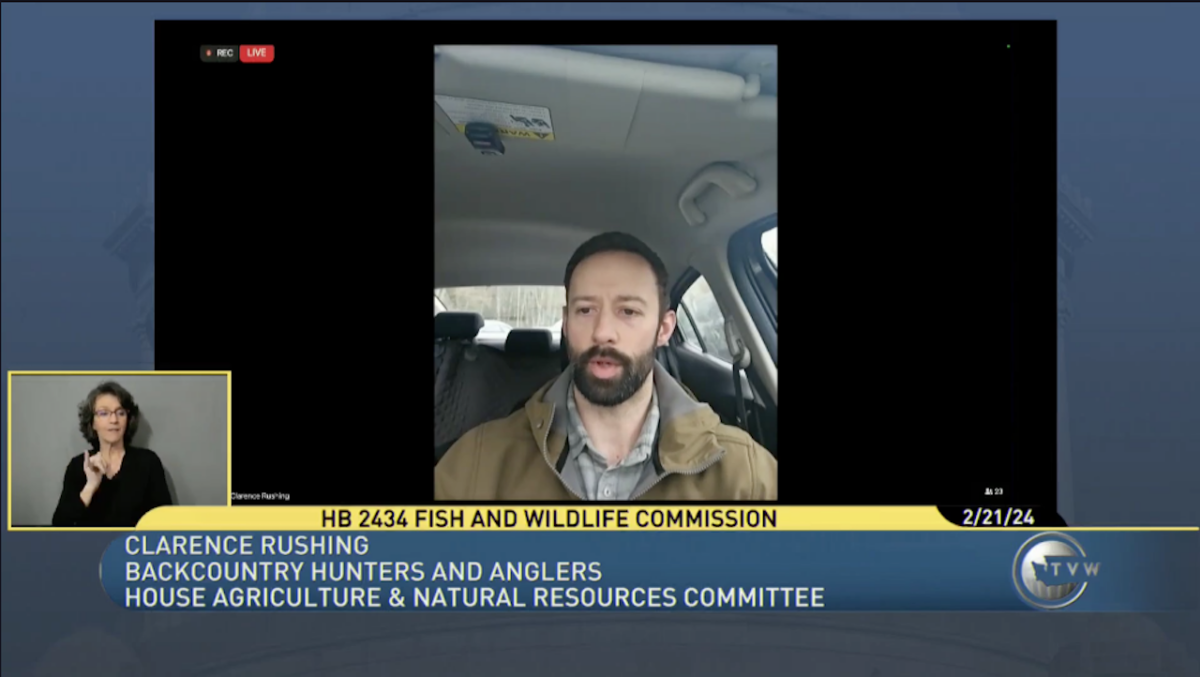
Clarence Rushing of the Washington Chapter of Backcountry Hunters and Anglers offered a measured “other” on the bill.
“While we believe the commission model and intent are sound, it all relies upon the governor and the appointees of the commission approaching this work in good faith, which we believe requires significant near-term course corrections to begin re-establishing trust and getting to work on the full spectrum of natural resources and environmental management that the state needs and that you were appointed to execute,” he stated.
BUT MOST WHO SPOKE TODAY WERE AGAINST the bill, especially fish and wildlife reformists who were able to sneak a last-minute proviso into last year’s budget requiring a big university review of WDFW and its mandate, governance and more, which is due in June and could serve as a preface to changes to the agency and its commission.
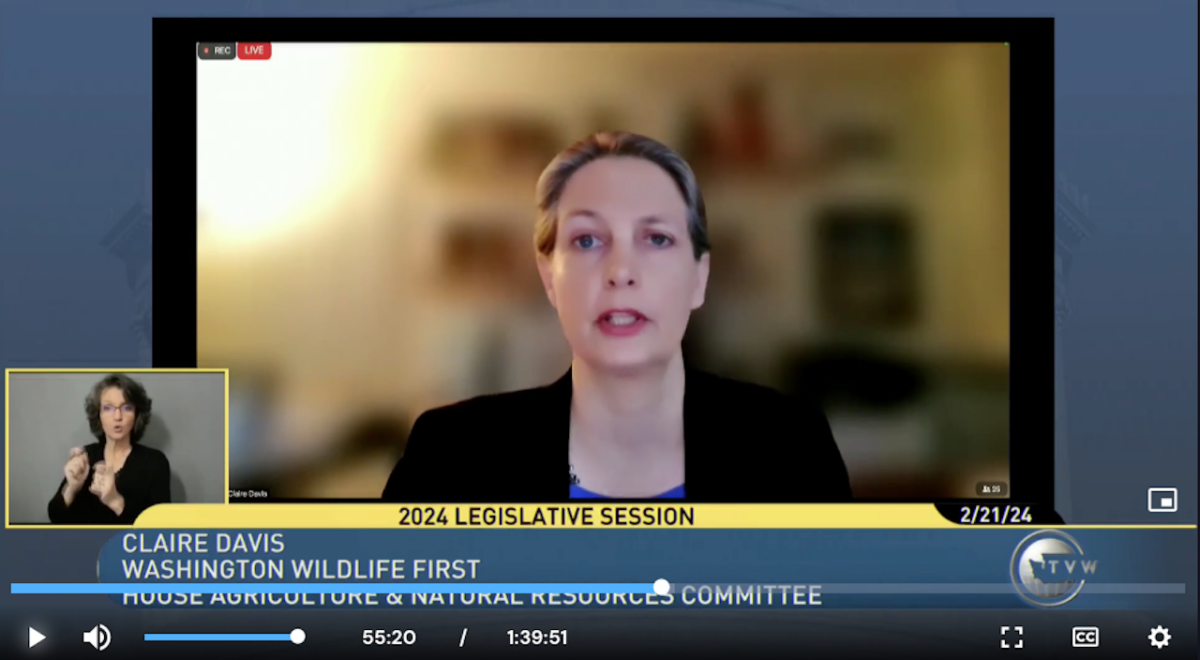
Claire Loeb Davis of Washington Wildlife First said HB 2434 “levels unjustified inflammatory and divisive accusations at current commissioners.” She said that claims the panel was ignoring science were ironic given that marine mammal, Forest Service and retired ungulate biologists sit on it.
And she said it was “absurd” to say that they and other commissioners were ignoring their legislative mandate, “the first directive of which is to quote preserve, protect and perpetuate end quote state fish and wildlife.”
It was curious that Loeb Davis specifically left out the “and manage the wildlife and food fish, game fish, and shellfish in state waters and offshore waters …” portion of that mandate statement from the legislature, and while she did add that she watched commissioners “struggle” to balance preservation with “the duties that it owes to the tribes and its responsibility to protect opportunities to fish and hunt,” her creative peeling off of consumptive use based on comma usage appears to be a new talking point to defend against.
“The current mandate states that the first and overarching goal of the department and commission is to quote preserve, protect and perpetuate wildlife,” echoed Josh Rosenau of the Mountain Lion Foundation, “with promotion of resource extraction and extractive industries and hobbies secondary to that goal.”
Officially, he was an “other” on the bill.
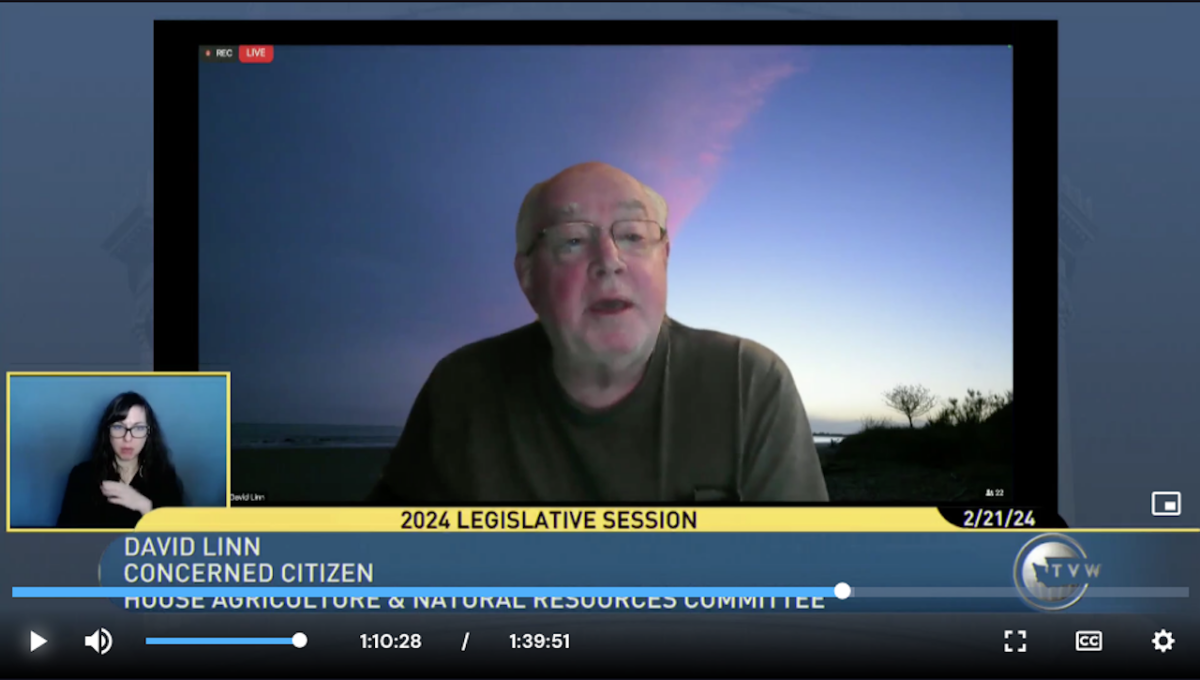
David Linn, of Washington Wildlife First but speaking on his own behalf, at least included the “manage” portion in his testimony, but he also said Wilcox’s bill was “directed by those whose feet are firmly planted in the past and who seek to recreate the errors of our forebears, those who created so much damage to wildlife that even to this day we are still dealing with endangered species of animals.”
He called it a “political document” and an “unwarranted attack” on the commission.
Others against the bill included Susan Kane-Ronning of the Washington chapter of the Sierra Club, who said it would lead to subjectivity based on who the governor was at any given time and who they might put in WDFW’s hottest seat, and Carole Richmond, who said without the commission, the state’s fish and wildlife “would likely end up overfished and overhunted.”
David Moskowitz of The Conservation Angler said the tone of some of the day’s comments were “disappointing” and noted an August 2023 commission-tribal meeting on comanagement Wilson will have been aware of.
All totaled, 11 people signed in to testify against HB 2434, two as pro and five as other; 417 registered their opposition, 122 their support and seven were other.
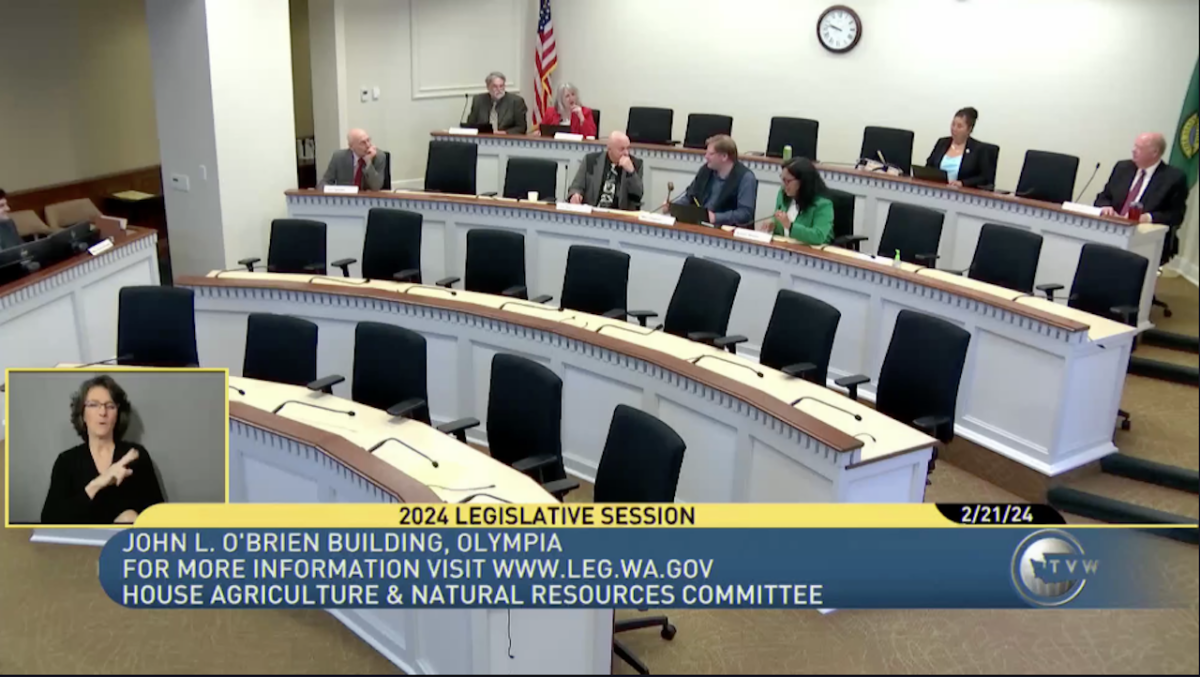
IF SPORTSMEN EGOS ARE BRUISED after being told they’re rooted in ancient hobbies and unable to control their harvest if left to their own devices, the reformists will be smarting over their champions being called paternalistic and “pretty much racist.”
That last one is a particularly fiery charge in this day and age of cancel culture, and while the House Agriculture and Natural Resource Committee’s two-minute timer would not have lent itself to a fuller explanation from the Lummi Nation’s Wilson, perhaps we’ll see more from her on that point substantively fleshed out in the NWIFC’s monthly Being Frank column.
That’s named after longtime chair Billy Frank Jr., he who fought the power to affirm treaty-reserved rights to half the harvestable salmon and steelhead, as manifested in the Boldt Decision, the 50th anniversary of which was celebrated two and a half weeks after the Fish and Wildlife Commission came to a screeching halt on the Conservation Policy.
As an update to that halt, according to WDFW this afternoon, no commission-tribal meetings in regards to consultation on the policy have been scheduled, though it’s believed Chair Baker has been in contact with one tribal rep on the process of consultation.
So far, seven individual tribes have requested to meet – Lummi, Stillaguamish, Swinomish, Puyallup, Lower Elwha, Quileute and Kalispel – and the Snoqualmie Tribe and NWIFC have also expressed concerns.
For preservationists, running up against treaty rights and tribal comanagement or management represents a not very easily solved conundrum. Witness the lonely anguish of a wolf fan ruing legal regulated tribal harvest of federally delisted wolves and having zero public backup from environmental groups.
BACK TO TODAY’S BILL HEARING and the feedback it generated, which was what Wilcox will have been looking for in part.
“We’ve released the hand grenade and we’re going to have a big discussion and we’ll carry that on in the near future, but it’s certainly put the commission on notice,” he stated recently on Fish Hunt Northwest.
Observing all this, it’s remarkable that exactly two years ago this situation was completely reversed. Then, it was the reformists and their allies in Olympia pulling hard to change things, filing bills, holding hearings, and they eventually achieved some of their goals through three-term Governor Jay Inslee and his office’s appointments to the commission.
They could run the table some more with the budget proviso’s University of Washington-Washington State University Ruckelhaus Center review.
Naturally, it’s all led to pushback and adaptive tactics from the traditionalist side, including a successful lawsuit over Commissioner Lorna Smith’s position on two appointive boards (she’s no longer on the Jefferson County Planning Commission) and another one shining a light on the appointments of her and other members. Senate Joint Resolution 8208, to hold a public vote to enshrine hunting, fishing and foraging rights in the state constitution, had a hearing and while it died, was also emblematic of that push and pull too. And as I reported on the anniversary of Boldt, sportsmen and tribes are finding themselves in alignment over the commission.
Lord knows I’m no deep thinker, nor do I have any solutions to this problem, let alone any others in my life, but an idea that came up in the 2022 legislature has rattled around in the back of my head ever since.
Senator Jim Honeyford, a Yakima Valley Republican who has since passed away, proposed that when a commission seat is vacated or the governor hems and haws too damn long about filling a position, a four-person panel consisting of the top Democrats and Republicans in both the House and Senate would appoint someone to the post.
Theoretically, something like that could allow for a compromise pick rather than the slew of one-sided nominations we’ve seen since early 2021.
I take a lot of crap from my oldest son for being a centrist, but 1) fish and wildlife are pretty purple issues, actually, and 2) I don’t think that the fish and wildlife of the state, their habitat, the hunting and angling opportunities, and the governance and future and widespread support for all of that is helped by the yanking that’s going on over the Fish and Wildlife Commission and WDFW.
I just don’t. It’s like the stupid idiotic endless battle over wolves in the Northern Rockies, creatures that are beyond recovered and will never go away.
I understand that when you’re the party in power, you get to pick committee chairs, appointees – the whole nine yards – and that’s just the way it’s always been. But harkening back to the mid-1990s initiative that created the Fish and Wildlife Commission to try and remove politics from the equation, I wonder about setting up a larger but equally weighted Honeyfordesque bipartisan panel to better vet nominees and get wide stakeholder buy-in before appointing them to the panel.
I don’t know. One question that of course springs to mind is, well, who vets the vetters?
I do know that putting commission seats up for statewide or even regional elections is a Bad Damn Idea That I Wish Would Just Die Already. That’s a recipe for expanding this battle at even more detriment to the resource and WDFW.
I guess at this point, as I await the next round of magazine proofreading to hit my desk – oh, wait, some werds just arrived – I’m just kind of rambling, so I’ll cut this off with one final thought.
I want to extend a huge hat tip to the House Agriculture and Natural Resources Committee. Their work this legislative session was more than done today, the eight members in attendance had been officially excused by Chair Mike Chapman (D-PA) to do other things if they wanted, they did not have to listen the public hearing on HB 2434 – “a bill introduced after cutoff,” as the chair pointedly noted – but he held it and they stuck around.
I’ve appreciated how the committee has worked together on tough fish and wildlife issues and often have come to unanimous recommendations in moving bills forward. Wolves. Elk and deer crop damage.
I think that that sort of approach lends itself somehow to this greater question about what to do about the Fish and Wildlife Commission and getting it back on the tracks.
And that’s gonna have to be all the time I have for that.
